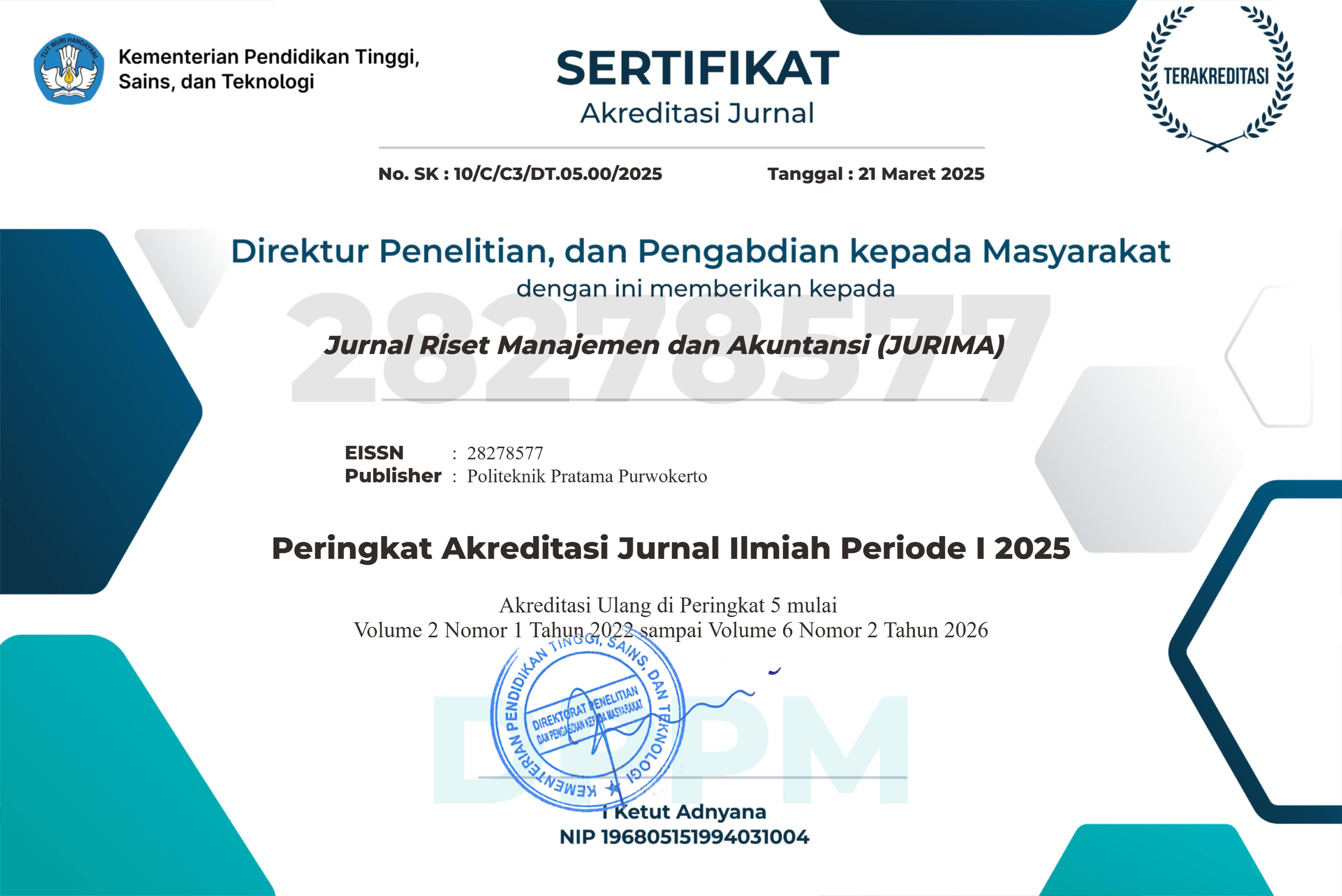Pengaruh Kemudahan Navigasi, Kualitas Pelayanan, Pengalaman Konsumen Terhadap Loyalitas Konsumen pada Platform Pesan Antar Makanan
DOI:
https://doi.org/10.55606/jurima.v5i2.5403Keywords:
Consumer Experience, Consumer Loyalty, Continuance Intention, Expectation Confirmation Model, Navigation Ease.Abstract
This study aims to analyze the influence of navigation ease, service quality, and consumer experience on consumer loyalty in digital food delivery platforms in Indonesia. The research employed a quantitative method using the Structural Equation Modeling approach with Partial Least Squares (PLS-SEM). Data were collected from 233 active users of services such as GoFood, GrabFood, and ShopeeFood, aged between 17–35 years. The results show that navigation ease, service quality, and consumer experience significantly affect user confirmation, which in turn impacts perceived usefulness, satisfaction, continuance intention, and consumer loyalty. Consumer experience had the greatest influence on confirmation, while continuance intention showed the strongest effect on loyalty. This study highlights the importance of enhancing user experience and digital service quality to sustain long-term consumer loyalty.
Downloads
References
Abedi, E., & Jahed, A. (2020). … affinity and brand on brand equity with the mediating role of customer satisfaction in Iran Insurance Company (Case Study: Tehran province branches customers). International Journal of Information, 12(1).
Al Mamun, A., Yang, M., Hayat, N., Gao, J., & Yang, Q. (2025). The nexus of environmental values, beliefs, norms and green consumption intention. Humanities and Social Sciences Communications, 12(1), 634. https://doi.org/10.1057/s41599-025-04979-6
Amin, F. (2022). Faktor-Faktor Yang Mempengaruhi Loyalitas Mobile Food Delivery Menggunakan Extended Expectation Confirmation Model (ECM) [Skripsi, Universitas Islam Negeri Syarif Hidayatullah Jakarta]. https://repository.uinjkt.ac.id/dspace/bitstream/123456789/65587/1/FADLI%20AMIN-FST.pdf
Amoroso, D. L., Ackaradejruangsri, P., & Lim, R. A. (2018). The impact of inertia as mediator and antecedent on consumer loyalty and continuance intention. In Mobile Commerce (pp. 960–981). https://doi.org/10.4018/978-1-5225-2599-8.ch045
Anggreeni, K. U. N. (2022). Pengaruh Kepuasan dan Loyalitas Pengguna pada Traveloka Eats Berbasis Mobile dengan Menggunakan Metode Expectation Confirmation Model (ECM) Extended [Skripsi, Universitas Islam Negeri Syarif Hidayatullah Jakarta]. https://repository.uinjkt.ac.id/dspace/bitstream/123456789/69141/1/KHOFIFATUS%20ULIN%20NUHA%20ANGGREENI-FST.pdf
Bhattacherjee, A. (2001). An empirical analysis of the antecedents of electronic commerce service continuance. Decision Support Systems, 32(2), 201–214. https://doi.org/10.1016/s0167-9236(01)00111-7
Bhattacherjee, A. (2001b). Understanding information systems continuance: An expectation-confirmation model. MIS Quarterly, 25(3), 351. https://doi.org/10.2307/3250921
Friska Mastarida. (2023). Hubungan kualitas layanan, pengalaman konsumen, kepuasan konsumen, dan loyalitas konsumen: Model konseptual. ARBITRASE: Journal of Economics and Accounting, 3(3), 521–526. https://doi.org/10.47065/arbitrase.v3i3.702
Hair, J. F., Black, W. C., Babin, B. J., & Anderson, R. E. (2019). Multivariate data analysis (8th ed.). Cengage Learning.
Haryanto, A. T. (n.d.). APJII: Jumlah Pengguna Internet Indonesia Tembus 221 Juta Orang. Detikinet [Jakarta]. Diakses dari https://inet.detik.com/cyberlife/d-7169749/apjii-jumlah-pengguna-internet-indonesia-tembus-221-juta-orang
Holbrook, M. B., & Hirschman, E. C. (1982). The experiential aspects of consumption: Consumer fantasies, feelings, and fun. Journal of Consumer Research, 9(2), 132–140.
Kim, S. H., Bae, J. H., & Jeon, H. M. (2019). Continuous intention on accommodation apps: Integrated value-based adoption and expectation–confirmation model analysis. Sustainability, 11(6), 1578. https://doi.org/10.3390/su11061578
Liu, Y., Li, Q., Edu, T., & Negricea, I. C. (2020). Travel applications in Chinese tourists: Integrated expectation-confirmation and IS success model. Journal of Hospitality & Tourism Research, 44(7), 1203–1228. https://doi.org/10.1177/1096348020962553
Lubis, M. D., & Sitorus, D. H. (2023). Pengaruh kemudahan, keamanan, dan kepercayaan terhadap loyalitas konsumen. Target: Jurnal Manajemen Bisnis, 5(2), 209–218. https://doi.org/10.30812/target.v5i2.3021
López-Miguens, M. J., & Vázquez, E. G. (2017). An integral model of e-loyalty from the consumer’s perspective. Computers in Human Behavior, 72, 397–411. https://doi.org/10.1016/j.chb.2017.02.003
Muhammad Fikri, & Ahmad Junaidi. (2024). Perubahan pola konsumsi dan gaya hidup masyarakat Indonesia di era digital. JUPSI Jurnal Pendidikan Sosial Indonesia, 2(1), 12–19. https://doi.org/10.62238/jupsi.v2i1.139
Nguyen, G., & Ha, M. (2021). The role of user adaptation and trust in understanding continuance intention towards mobile shopping: An extended expectation-confirmation model. Cogent Business & Management, 8(1). https://doi.org/10.1080/23311975.2021.1980248
Oktavia, V. D., Sarsono, S., & Marwati, F. S. (2022). Loyalitas pelanggan ditinjau dari pelayanan, kepuasan dan kepercayaan pada CV Cipta Kimia Sukoharjo. Jurnal Ilmiah Edunomika, 6(1), 540. https://doi.org/10.29040/jie.v6i1.4656
Parasuraman, A., Berry, L., & Zeithaml, V. (2002). Refinement and reassessment of the SERVQUAL scale. Journal of Retailing, 67(4), 69–139.
Putra, E. D., Athaullah, S., & Yusuf, A. (2023). Pengaruh perceived ease of use, perceived enjoyment, perceived usefulness, dan satisfaction terhadap continued IT usage intention: Expected-confirmation model (ECM). Jurnal Maksipreneur: Manajemen, Koperasi, dan Entrepreneurship, 13(1), 1. https://doi.org/10.30588/jmp.v13i1.1051
Rainer, P. (2024, February 12). Indonesia juara satu penjualan online food delivery tingkat Asia Tenggara. GoodStast. Diakses dari https://goodstats.id/article/indonesia-juara-satu-penjualan-online-food-delivery-tingkat-asia-tenggara-JOc9Y
Ranti Putri Pratiwi, Angga Putri Ekanova, & Olivia Puspita Nagari. (2022). Pengaruh promosi Dan kemudahan penggunaan terhadap loyalitas pelanggan pada layanan shopeefood Di Jakarta. Jurnal Ekonomi dan Manajemen, 1(2), 18-28. https://doi.org/10.56127/jekma.v1i2.130
Raza, S. A., Umer, A., Qureshi, M. A., & Dahri, A. S. (2020). Internet banking service quality, e-customer satisfaction and loyalty: The modified e-SERVQUAL model. TQM Journal, 32(6), 1443–1466. https://doi.org/10.1108/TQM-02-2020-0019
Schmitt, B. H. (1999). Experiential marketing: How to get customers to sense, feel, think, act, and relate to your company and brand. The Free Press.
Subawa, N. S., Widhiasthini, N. W., & Mimaki, C. A. (2020). An empirical study of E-marketplace acceptance in MSMEs under the constructs of effort expectancy, social influence and facilitating condition factors. In Proceedings of the 2020 The 6th International Conference on E-Business and Applications (pp. 116–120). https://doi.org/10.1145/3387263.3387288
Sugiyono. (2020). Metode Penelitian Kuantitatif, Kualitatif dan R&D. Alfabeta.
Susanto, A., Chang, Y., & Ha, Y. (2016). Determinants of continuance intention to use the smartphone banking services. Industrial Management & Data Systems, 116(3), 508–525. https://doi.org/10.1108/imds-05-2015-0195
Varshneya, G., & Das, G. (2017). Experiential value: Multi-item scale development and validation. Journal of Retailing and Consumer Services, 34, 48–57. https://doi.org/10.1016/j.jretconser.2016.09.010
Wong, K. K.-K. (2013). Partial least squares structural equation modeling (PLS-SEM) techniques using SmartPLS. Marketing Bulletin, 24(1), 1–32.
Yolandari, N. L., & Kusumadewi, N. M. (2018). Pengaruh pengalaman pelanggan dan kepercayaan terhadap niat beli ulang secara online melalui kepuasan pelanggan (Studi pada situs online Berrybenka.com). E-Jurnal Manajemen Universitas Udayana, 7(10), 5343. https://doi.org/10.24843/ejmunud.2018.v07.i10.p06
Downloads
Published
How to Cite
Issue
Section
License
Copyright (c) 2025 Jurnal Riset Manajemen dan Akuntansi

This work is licensed under a Creative Commons Attribution-ShareAlike 4.0 International License.










